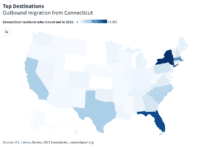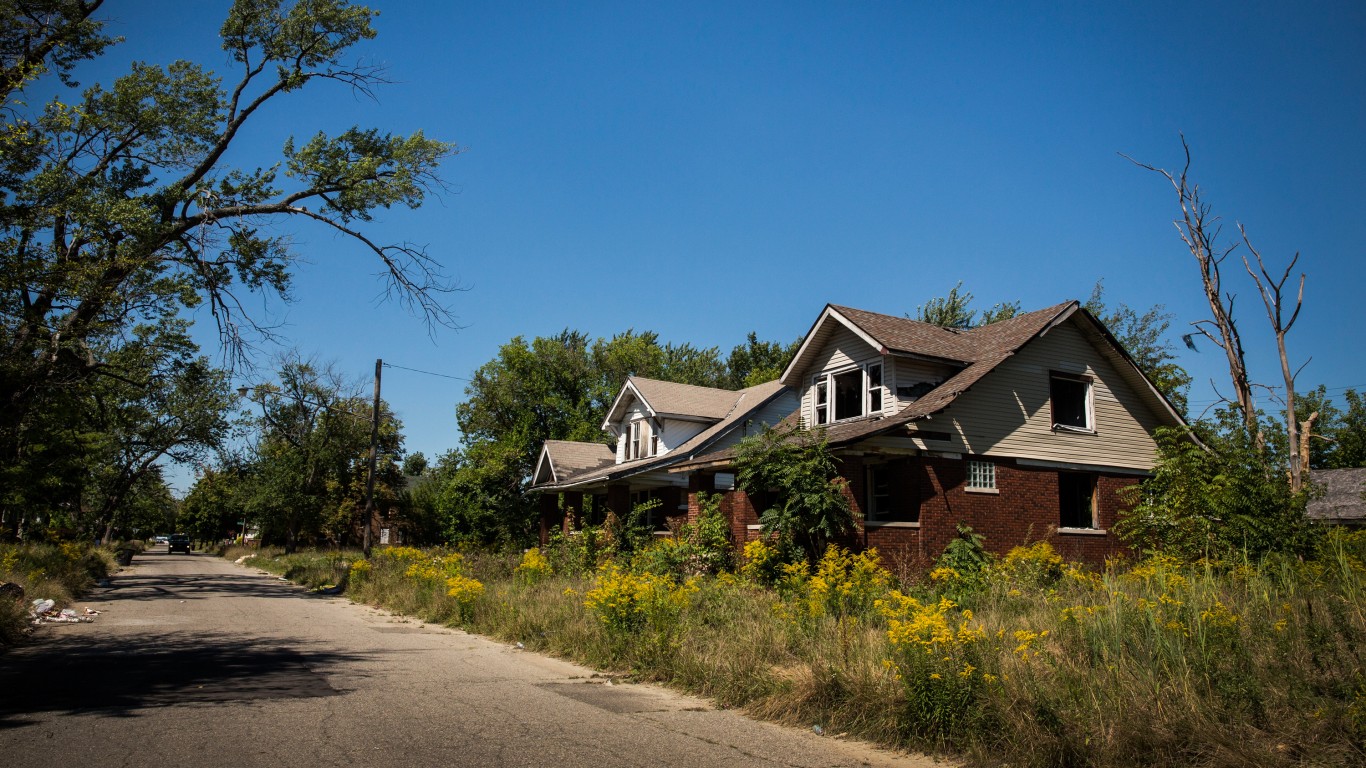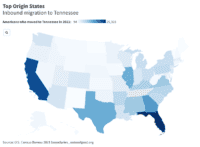
According to the 2018 United Nations Human Development Index — a composite measure of education, life expectancy, and standard of living — the United States is the 13th most developed country in the world, behind nations such as Norway, Switzerland, and Australia.
While the United States as a whole falls behind a number of European and Asia-Pacific countries, conditions are far from uniform across the country, and some parts of the country outrank much of the world in livability. In some U.S. counties, median household income and educational attainment rates can more than double the national averages. Additionally, some U.S. counties have an average life expectancy at birth that is higher than in any country worldwide.
Building on the United Nations’ Human Development Index, 24/7 Wall St. constructed an index of education, poverty, and life expectancy to determine the 25 best U.S. counties to live in.
Adults with greater educational attainment are more likely to be financially secure and healthy — and partially as a result, the best-educated communities in the country are also often among the healthiest and highest earning. While nationwide, 30.9% of adults 25 and over have at least a bachelor’s degree, the bachelor’s degree attainment rate in each of the 25 counties on this list exceeds 45%. For more on education in America, see the most and least educated states and the most educated city in every state.
Higher-income individuals often have better access to health care and are able to afford a greater range of healthy options related to diet and lifestyle, and as a result, they often live longer and healthier lives. In each of the counties on this list, life expectancy at birth exceeds the 79.1 year national average by at least two years.
Many of the best counties are within commuting distance of major cities, such as New York City and Washington, D.C., where large shares of residents commute to jobs in high-paying industries such as professional, scientific, technical services, and government. In 13 of the 25 counties on this list, the share of workers who commute to jobs outside of their home county exceeds the national average of 25.7%. Likely due in part to their proximity to metropolitan job markets, the unemployment rate in all 25 of the best counties to live is lower than the national rate.
Jobs, high incomes, and access to healthier lifestyles are primary pull factors for America’s upwardly and geographically mobile population. In 19 of the 25 counties on this list, population growth over the past five years has exceeded the 3.8% national population growth rate. Several of the 25 counties on this list rank as the fastest growing county in their respective state.
Click here to see the 25 best counties to live in
Click here to read our methodology

25. Middlesex County, Massachusetts
> Largest place in county: Lowell
> Bachelor’s degree attainment rate: 54.1%
> Poverty rate: 8.2%
> Life expectancy: 81.6 years
> Median household income: $92,878
People with higher incomes tend to have healthier lifestyles. In Middlesex County, just 11.3% of adults smoke, and only 18% of adults are physically inactive — less than the national smoking rate of 17.0% and inactivity rate of 22.0%. Healthy lifestyles lead to positive outcomes in Middlesex County as average life expectancy at birth is 81.6 years, more than two and a half years longer than it is nationwide.
[in-text-ad]

24. Santa Clara County, California
> Largest place in county: San Jose
> Bachelor’s degree attainment rate: 50.0%
> Poverty rate: 8.6%
> Life expectancy: 83.1 years
> Median household income: $106,761
Santa Clara County in California contains San Jose and much of the Silicon Valley area, a tech innovation hub. Companies like Google, Apple, and Hewlett Packard are all headquartered in the county, providing thousands of high-paying jobs to residents. In Santa Clara County, 22.4% of households earn at least $200,000 annually, the sixth largest share of any U.S. county. Santa Clara also ranks as one of the best places to live due to the health of its residents. Just 16.1% of adults do not exercise, and only 19.8% are obese — far less than the national inactivity rate of 22.0% and obesity rate of 29.0%. Overall, the life expectancy at birth in Santa Clara is 83.1 years, four years longer than the U.S. average.

23. San Mateo County, California
> Largest place in county: Daly City
> Bachelor’s degree attainment rate: 48.5%
> Poverty rate: 7.3%
> Life expectancy: 83.1 years
> Median household income: $105,667
San Mateo is one of several counties in the San Francisco Bay region to rank among the best places to live based on education level, poverty rate, and life expectancy. Over half of all households in San Mateo County earn over $105,000 a year, and 22.5% of households earn over $200,000 a year, more than three times the corresponding share nationwide.
Wealthier Americans tend to have better access to health care and can afford a greater range of healthy options related to diet and lifestyle and, partially as a result, they often live longer, healthier lives. In San Mateo, the average life expectancy is 83.1 years — four years longer than the national average.

22. Summit County, Utah
> Largest place in county: Park City
> Bachelor’s degree attainment rate: 53.5%
> Poverty rate: 7.5%
> Life expectancy: 82.4 years
> Median household income: $94,952
Summit County’s population is well educated and has high incomes. Over half of all adults in the county have a bachelor’s degree or higher, the largest share in Utah, and the typical household has an income of nearly $95,000 year, also the most of any county in the state. Also, just 7.5% of residents live in poverty, nearly half the national poverty rate.
Situated just east of Salt Lake City and extending across Park City into the Uinta-Wasatch-Cache National Forest, Summit is also one of the most active counties in the country. Some 94.8% of residents have access to locations for physical activity, compared to 84.0% of Americans nationwide. Just 10.8% of adults do not exercise, the eighth smallest share of any U.S. county.
[in-text-ad-2]

21. Delaware County, Ohio
> Largest place in county: Delaware
> Bachelor’s degree attainment rate: 53.8%
> Poverty rate: 5.1%
> Life expectancy: 81.4 years
> Median household income: $100,229
Delaware County is the only county in Ohio — and one of only a few in the broader Midwestern United States — to rank among the best places to live based on education, poverty, and life expectancy. Delaware is the only one of Ohio’s 88 counties where over half of all households earn at least $100,000 a year.
The county is located just north of Columbus, providing area residents with access to jobs in and around the state capital. Some 59.3% of workers commute outside of the county to their jobs, more than twice the national share. Likely due in part to their proximity to the range of job opportunities common in big cities, just 3.6% of workers in the Delaware County are unemployed, below the 4.0% national unemployment rate.

20. Carver County, Minnesota
> Largest place in county: Chaska
> Bachelor’s degree attainment rate: 47.5%
> Poverty rate: 4.0%
> Life expectancy: 82.8 years
> Median household income: $93,095
Situated just outside of Minneapolis, Carver County is one of only four Midwestern counties to rank among the best places to live, and the only one in Minnesota. Some 63.0% of workers commute outside the county for work — many to Minneapolis and St. Paul — more than twice the 25.7% national share. Likely due in part to their proximity to jobs in a major metropolitan area, just 3.0% of the county’s workforce was unemployed as of July, well below the 4.0% U.S. unemployment rate.
Carver County is also one of the areas in the country where poverty is most rare. Just 4.0% of residents live in poverty, less than a third of the 14.6% national poverty rate.
[in-text-ad]

19. San Miguel County, Colorado
> Largest place in county: Telluride
> Bachelor’s degree attainment rate: 54.1%
> Poverty rate: 10.5%
> Life expectancy: 83.7 years
> Median household income: $62,243
San Miguel County is located in southwestern Colorado, along the Utah state border. While the county’s median annual household income of $62,243 is only marginally higher than the national median of $57,652, serious financial hardship is far less common in San Miguel than it is nationwide. Just 10.5% of county residents live below the poverty line, well below the 14.6% national poverty rate.
San Miguel is one of the best educated counties in the United States. Among residents 25 and older, 54.1% have a bachelor’s degree or higher. Nationwide, just 30.9% of adults have a bachelor’s degree.
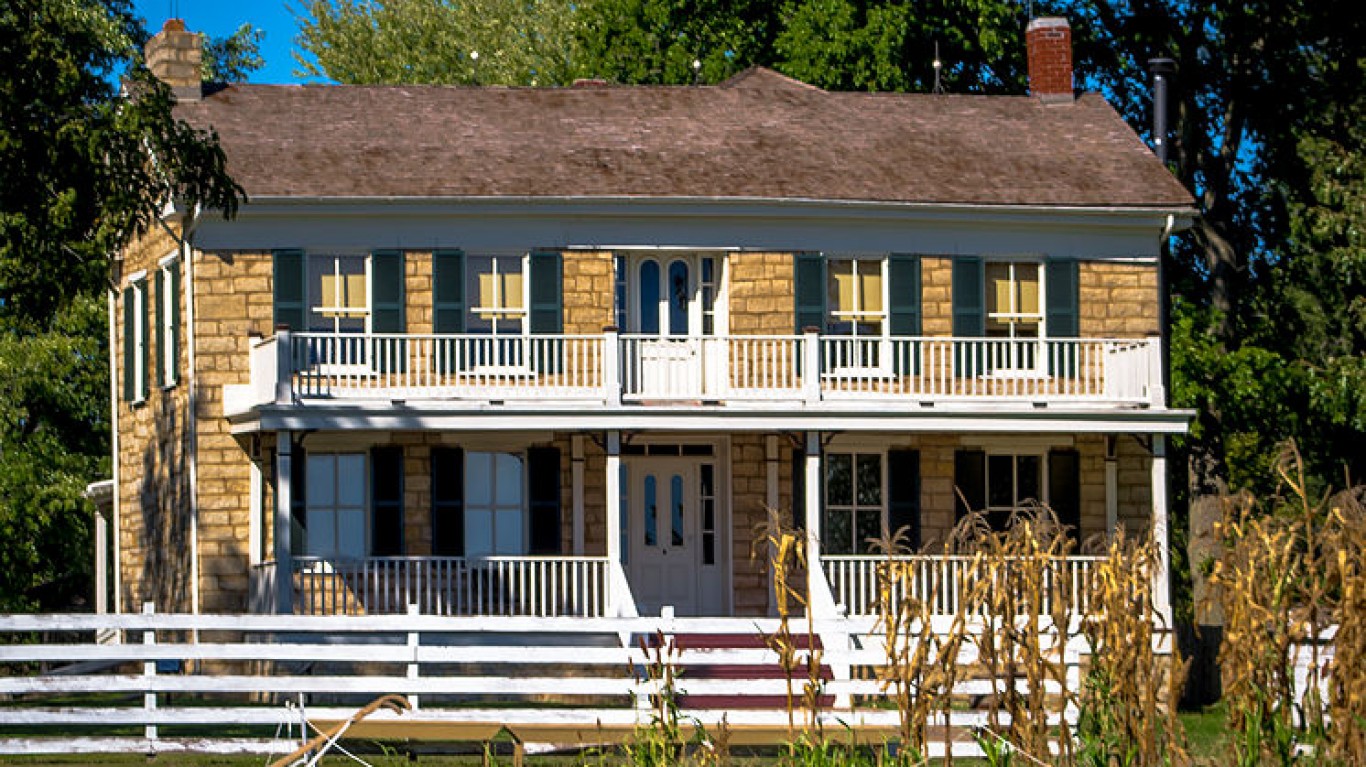
18. Johnson County, Kansas
> Largest place in county: Overland Park
> Bachelor’s degree attainment rate: 54.6%
> Poverty rate: 5.6%
> Life expectancy: 81.7 years
> Median household income: $81,121
Johnson County makes up the southwestern part of the Kansas City metropolitan area and borders Missouri. With 54.6% of adult residents holding at least a bachelor’s degree, the area is one of the best educated in the country. For comparison, 30.9% of American adults hold a four-year college degree.
Johnson County residents are among the least likely to live below the poverty line. The area’s poverty rate of just 5.6% is a full 9 percentage points below the U.S. poverty rate. Although the area’s $81,121 median household income is lower than that of most counties on this list, it is still one of the 100 highest among U.S. counties, and more than $23,000 above the U.S. median.
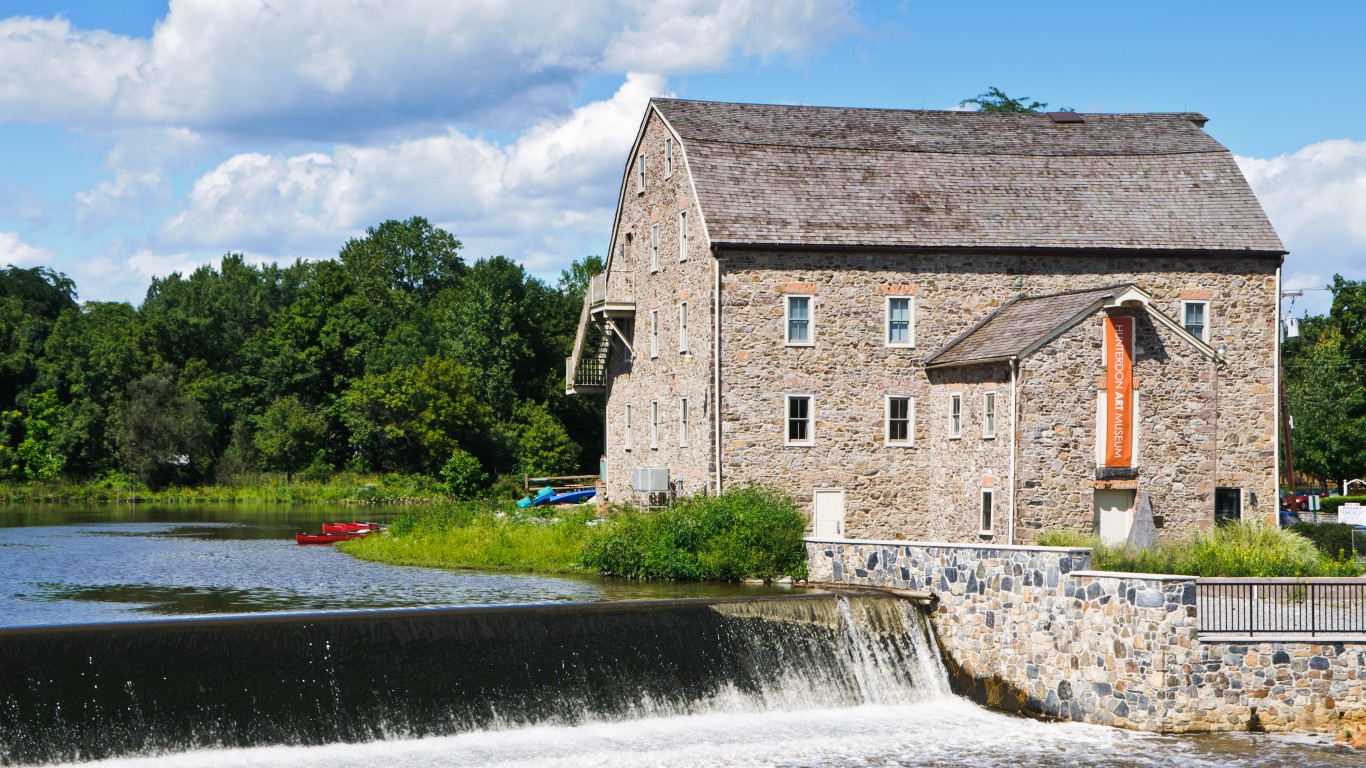
17. Hunterdon County, New Jersey
> Largest place in county: Flemington
> Bachelor’s degree attainment rate: 50.7%
> Poverty rate: 4.5%
> Life expectancy: 82.5 years
> Median household income: $110,969
Hunterdon County is located in western New Jersey along the Pennsylvania state border, just north of Trenton. In Hunterdon, incomes are high and poverty is scarce. The typical household has an annual income of $110,969, nearly double the typical American household income. Additionally, just 4.5% of area residents live below the poverty line, less than a third of the 14.6% national poverty rate.
Across broad populations, incomes tend to rise with educational attainment. In Hunterdon County, over half of all adults have a bachelor’s degree. Nationwide, fewer than one in three adults have a four-year college degree.
[in-text-ad-2]

16. Morris County, New Jersey
> Largest place in county: Morristown
> Bachelor’s degree attainment rate: 52.6%
> Poverty rate: 4.6%
> Life expectancy: 82.0 years
> Median household income: $107,034
One of several counties within commuting distance of New York City to rank among the best places to live based on education, poverty, and life expectancy. Morris County is located approximately 40 miles west of Manhattan and is one of the wealthiest counties in the United States. Over half of all households have an annual income above $107,000 a year, and more than one in every five earn at least $200,000.
Wealthier Americans have access to a greater range of health care options as well as options related to diet and lifestyle, and as a result, they often have longer and healthier lives. In Morris County, just 18.4% of adults do not exercise and only 22.0% are obese — far less than the national inactivity rate of 22.0% and obesity rate of 29.0%. The county’s average life expectancy is 82 years, about three years longer than the average nationwide.
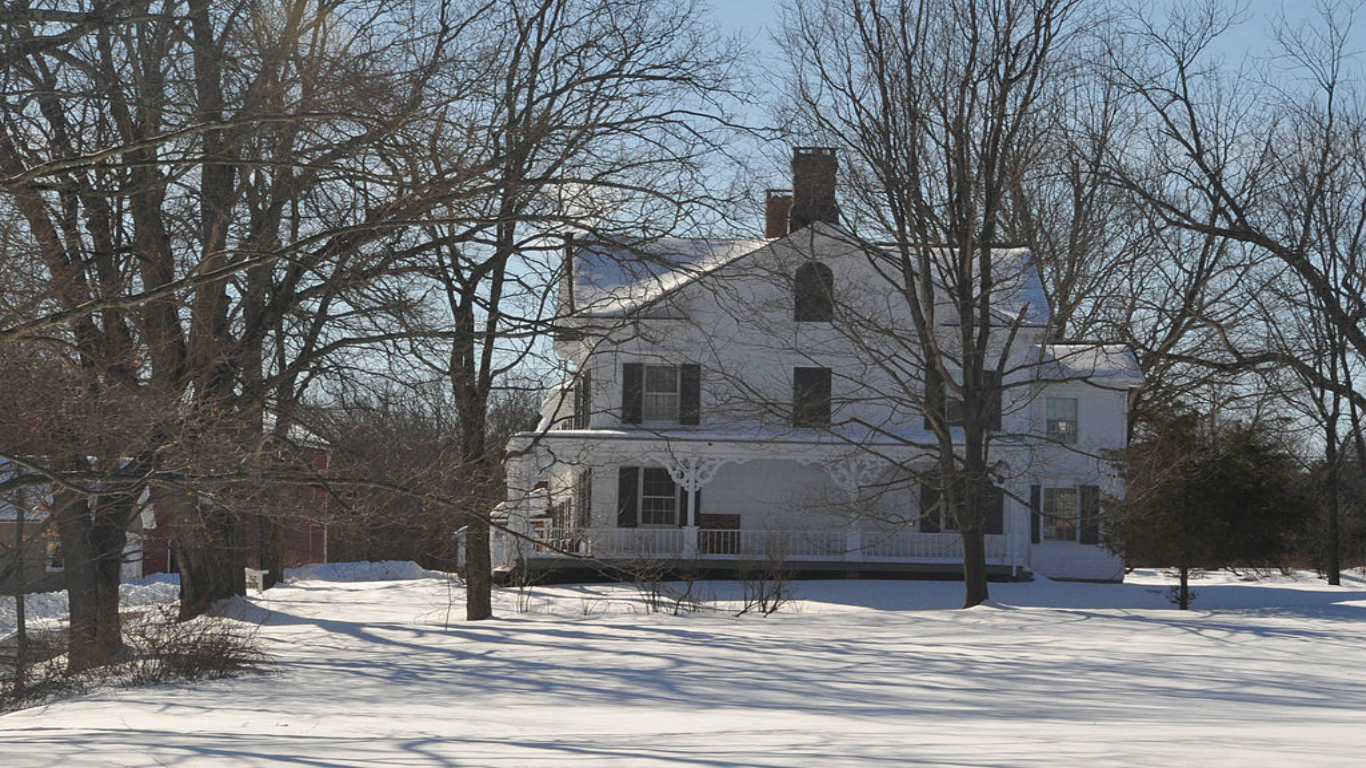
15. Somerset County, New Jersey
> Largest place in county: Somerset
> Bachelor’s degree attainment rate: 53.1%
> Poverty rate: 4.8%
> Life expectancy: 82.0 years
> Median household income: $106,046
Somerset County, New Jersey, is among the wealthiest places in the country, as it is one of fewer than two dozen American counties in which the typical household has an annual income of at least $100,000. The area’s high incomes are likely bolstered by the fact that more than half of adult residents have at least a bachelor’s degree, qualifying them for a broader range of well-paying jobs. The county is only about 60 miles from New York City, and many Somerset residents likely commute to jobs in the city.
Individuals with higher incomes and greater educational attainment tend to have better health behaviors and outcomes, and in Somerset County just 17.1% of adults do not exercise — far less than the 22.0% national inactivity rate. Life expectancy at birth in Somerset is 82 years, nearly three years longer than the U.S. average.
[in-text-ad]

14. Montgomery County, Maryland
> Largest place in county: Silver Spring
> Bachelor’s degree attainment rate: 58.3%
> Poverty rate: 7.0%
> Life expectancy: 81.5 years
> Median household income: $103,178
Home to the federal government and the countless jobs it supports, parts of Washington D.C. and the surrounding area are among the wealthiest in the country. Montgomery County, Maryland, is one of them. The county is home to several D.C. commuter towns, including Bethesda and Rockville, and the headquarters of several major corporations, including Lockheed Martin, the largest defense contractor in the world.
Montgomery has one of the wealthiest and best educated populations of any U.S. county. Most households in the area earn over $100,000 a year, and 58.3% of adults have a bachelor’s degree or higher, nearly double the 30.9% of adults nationwide.

13. Eagle County, Colorado
> Largest place in county: Edwards
> Bachelor’s degree attainment rate: 45.1%
> Poverty rate: 7.7%
> Life expectancy: 85.9 years
> Median household income: $83,803
Home to the city of Vail, and located near the well-known skiing towns of Aspen and Breckenridge, Eagle County is one of the wealthiest, best-educated, and healthiest counties in the country. Just 9.3% of county residents do not exercise, the second smallest share of any U.S. county. Additionally, the county’s life expectancy of nearly 86 years is about seven years longer than the national average.
The long life expectancy in Eagle County may be closely tied to the high incomes as wealthier Americans have access to a greater range of healthy options related to diet and lifestyle. The typical household in the county earns $83,803 a year, about $26,000 more than the typical American household.

12. Hamilton County, Indiana
> Largest place in county: Carmel
> Bachelor’s degree attainment rate: 57.5%
> Poverty rate: 5.0%
> Life expectancy: 81.8 years
> Median household income: $90,582
Like many of the best counties to live in based on education, poverty, and life expectancy, Hamilton County, Indiana, is located just outside of a major metropolitan area. The county’s close proximity to Indianapolis, the largest city in the state, provides residents with easy access to job opportunities and likely contributes to the county’s low unemployment rate. Just 2.8% of county residents are unemployed, well below the 4.0% national unemployment rate.
The typical household in Hamilton County has an annual income of $90,582, about $33,000 more than the U.S. median. Wealthier individuals are more likely to lead healthy lifestyles, and in the county just 14.0% of adults do not exercise — far less than the 22.0% national inactivity rate. Life expectancy at birth in the county is 81.8 years, nearly three years longer than the U.S. average.
[in-text-ad-2]

11. Teton County, Wyoming
> Largest place in county: Jackson
> Bachelor’s degree attainment rate: 54.1%
> Poverty rate: 6.8%
> Life expectancy: 83.5 years
> Median household income: $80,049
With fewer than 23,000 residents, Teton County is one of the least populous places on this list. It largely consists of federal land, like Yellowstone National Park and Grand Teton National Park. Nearly all residents — 99.7% — have access to locations for physical activity such as parks, and just 12.0% of adults do not exercise — compared to 22.0% of adults nationwide. Life expectancy at birth in the county is 83.5 years, the 16th longest of any U.S. county.
The positive health outcomes in Teton County are likely bolstered by the high area incomes. The typical Teton County household earns $80,049 a year, over $22,000 more than the U.S. median. Just 1.9% of households in the area live on less than $10,000 annually — one of the smallest shares in the country, and well below the 6.7% share nationwide.

10. Summit County, Colorado
> Largest place in county: Silverthorne
> Bachelor’s degree attainment rate: 47.8%
> Poverty rate: 10.3%
> Life expectancy: 86.8 years
> Median household income: $73,538
Summit County, Colorado, which is west of Denver and largely located in the White River National Forest, has one of the healthiest populations anywhere in the United States. Just 8.4% of adults in the county lead sedentary lives, the smallest share in the country. The average life expectancy at birth in the county is about 87 years, nearly eight years longer than the national average and the highest life expectancy of any U.S. county.
A relatively wealthy area, Summit County is home to several upscale ski resorts, including Copper Mountain and Breckenridge.
[in-text-ad]
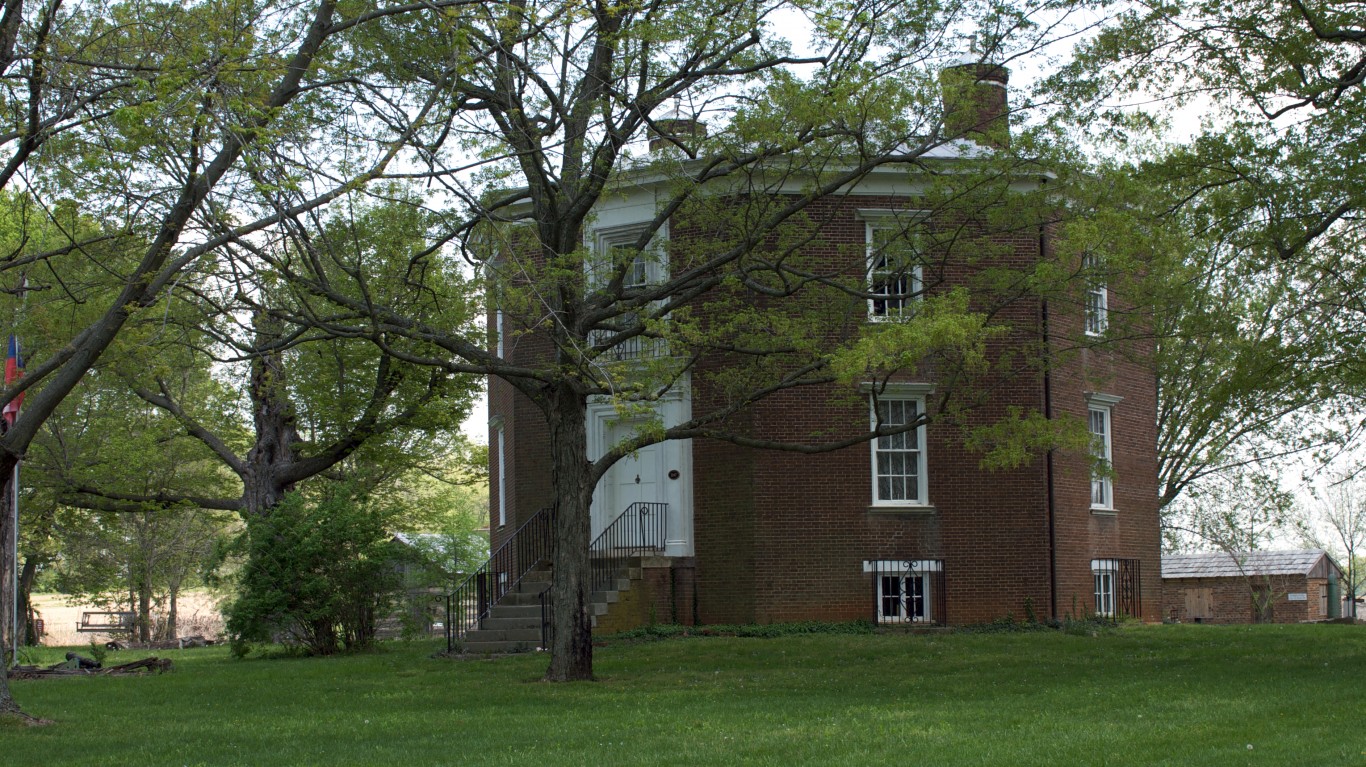
9. Williamson County, Tennessee
> Largest place in county: Franklin
> Bachelor’s degree attainment rate: 58.1%
> Poverty rate: 4.6%
> Life expectancy: 81.9 years
> Median household income: $103,543
Williamson County, located in central Tennessee, is the only county in the state to rank among the best places to live in the country based on education, poverty, and life expectancy. The county, located just south of Nashville, is one of the wealthiest in the nation, with a median household income of $103,543. It is also one of the best educated places in the country, with a 58.1% bachelor’s degree attainment rate .
Williamson County has many positive attributes, including a strong job market and close proximity to a major metro area, which is likely why it is one of the fastest growing parts of the country. The county’s population has grown 15.2% over the past five years, nearly four times the comparable 3.8% national population growth rate.

8. Marin County, California
> Largest place in county: San Rafael
> Bachelor’s degree attainment rate: 57.5%
> Poverty rate: 8.1%
> Life expectancy: 83.8 years
> Median household income: $104,703
Marin County is located across the Golden Gate Bridge from San Francisco. County residents are among the most likely to be very wealthy. Nearly a quarter of county households earn $200,000 a year or more. That’s nearly four times higher than the comparable national share. Additionally, the county’s poverty rate of 8.1% is well below the 14.6% national rate.
As is often the case in wealthy areas, Marin County residents tend to be relatively healthy. Just 9.7% of adults smoke, and only 12.0% report no leisure time physical activity — compared to the national smoking rate of 17.0% and inactivity rate of 22.0%. Average life expectancy in the county is 83.8 years, about five years longer than the national average.

7. Howard County, Maryland
> Largest place in county: Columbia
> Bachelor’s degree attainment rate: 61.2%
> Poverty rate: 5.2%
> Life expectancy: 83.0 years
> Median household income: $115,576
Howard County, Maryland, is one of the wealthiest parts of the country, with the typical household earning more than $115,000 per year. Residents are also among the least likely to face poverty, as just 5.2% of them live below the poverty line. Nationwide, 14.6% of Americans live in poverty.
The high incomes are partially attributable to the high educational attainment. Howard is one of just seven counties in which at least 60% of adults have a four-year college degree. This means that residents are more likely to be qualified for high-paying careers. The county is within commuting distance to both Washington, D.C. and Baltimore, and most working residents indeed commute to jobs outside of Howard County.
[in-text-ad-2]

6. Fairfax County, Virginia
> Largest place in county: Reston
> Bachelor’s degree attainment rate: 60.7%
> Poverty rate: 6.1%
> Life expectancy: 83.7 years
> Median household income: $117,515
Across the Potomac River from Washington, D.C., Fairfax County provides easy access to high-paying jobs in and around the nation’s capital. The area’s median household income of $117,515 is nearly the highest in the country, and more than double the U.S. median of $57,652. The county has one of the lowest unemployment rates in the nation, at just 2.1%.
Income and health are closely linked, as people with higher incomes can afford a greater range of healthy options related to diet and lifestyle as well as better access to health care. As one of the wealthiest places in the country, Fairfax County residents tend to live longer, on average, than Americans on average nationwide. Life expectancy in the county stands at 83.7 years, compared to 79.1 years nationwide.

5. Loudoun County, Virginia
> Largest place in county: Leesburg
> Bachelor’s degree attainment rate: 59.8%
> Poverty rate: 3.7%
> Life expectancy: 83.2 years
> Median household income: $129,588
Located across the Potomac River from Montgomery County, Maryland, another county on this list, Loudoun County, Virginia, is one of several counties within commuting distance of Washington D.C. to rank on this list. Proximity to the numerous jobs supported by the federal government partially explains the area’s 2.4% unemployment rate, one of the lowest of any county and well below the 4.0% national rate.
Many of the types of jobs in and around Loudoun County are high skilled and high paying. Nearly 60% of area adults have a bachelor’s degree or higher — roughly double the 30.9% national percentage — and the typical area household has an income of about $130,000 a year, the highest of any U.S. county by more than $12,000.
[in-text-ad]
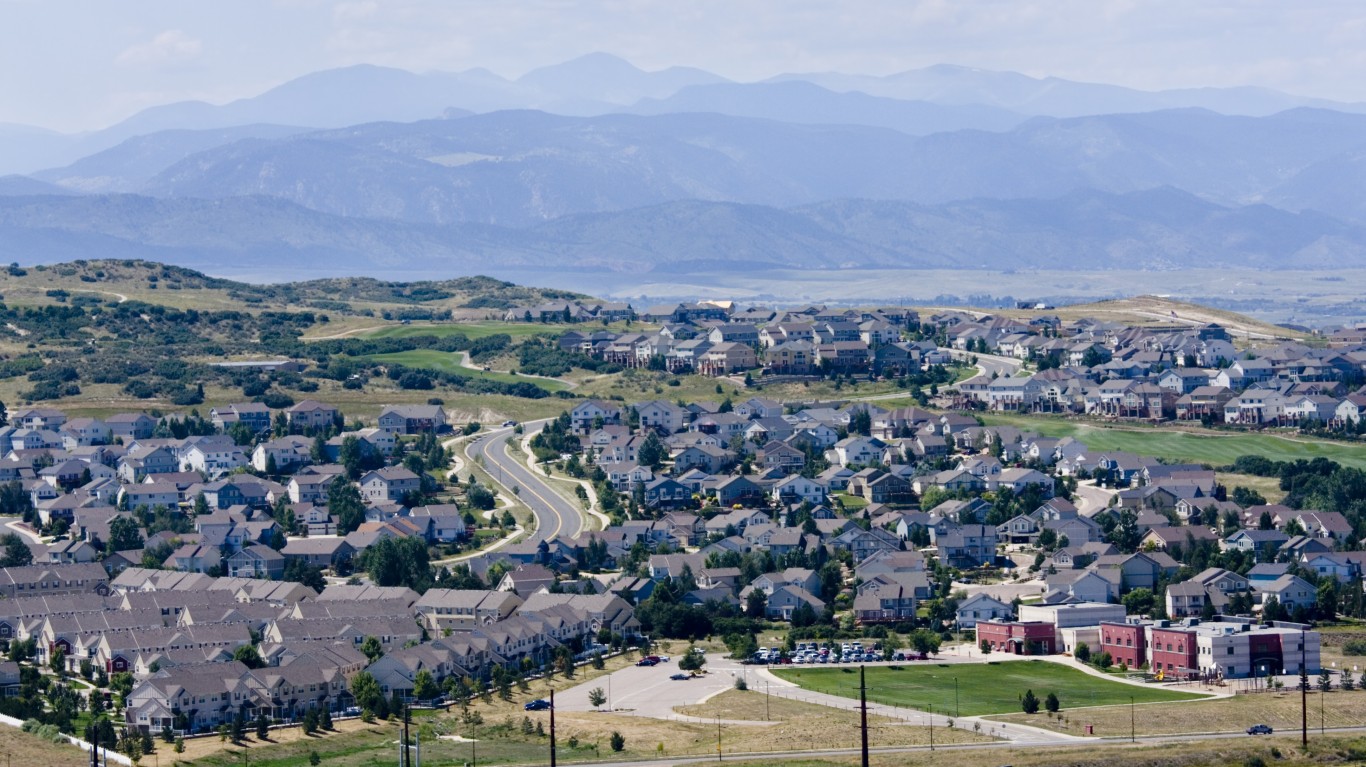
4. Douglas County, Colorado
> Largest place in county: Highlands Ranch
> Bachelor’s degree attainment rate: 58.0%
> Poverty rate: 3.6%
> Life expectancy: 83.7 years
> Median household income: $111,154
Bisected by Interstate 25, Douglas County sits in between Colorado Springs and Denver. Like the other four counties in Colorado to rank on this list, Douglas is home to a wealthy, well-educated, active population. Most households in the area earn well over $100,000 a year and 58% of adults in Douglas County have a four-year college degree — a far greater share than the 30.9% average nationwide. Just 9.6% of adults report no leisure time physical activity, the fourth smallest share of any U.S. county.
Like many of the best counties to live in based on education, poverty, and life expectancy, Douglas County is growing rapidly. In the last five years, the county’s population grew by 11.9%, more than three times as fast as the 3.8% national population growth rate over the same period.

3. Los Alamos County, New Mexico
> Largest place in county: Los Alamos
> Bachelor’s degree attainment rate: 65.5%
> Poverty rate: 5.1%
> Life expectancy: 83.5 years
> Median household income: $110,190
With the eighth highest median household income in the country, Los Alamos County, New Mexico, is a huge outlier in its state. The typical county household has an annual income of $110,190, over $63,000 more than the median for New Mexico as a whole. Los Alamos County is best known as the home of the Los Alamos National Laboratory, which helped develop the nuclear bomb. The lab is the community’s lifeblood, as the county has just over 18,000 residents and the lab has nearly 13,000 employees. Nearly two-thirds of the county’s residents hold at least a bachelor’s degree — the second largest share of any U.S. county — as many of the jobs at Los Alamos require an advanced education.

2. Arlington County, Virginia
> Largest place in county: Arlington
> Bachelor’s degree attainment rate: 74.1%
> Poverty rate: 8.2%
> Life expectancy: 82.8 years
> Median household income: $112,138
Home to the Pentagon, Arlington County, Virginia, sits directly across the Potomac River from Washington D.C. Like other counties on the outskirts of the nation’s capital, Arlington is home to a well-educated and wealthy population. Nearly three out of every four adults in Arlington have a bachelor’s degree or higher, the largest share of any county in the country. Incomes typically increase with educational attainment, and in Arlington, about 22% of all households earn at least $200,000 a year, more than three times the 6.3% share of households nationwide.
[in-text-ad-2]

1. Pitkin County, Colorado
> Largest place in county: Aspen
> Bachelor’s degree attainment rate: 61.2%
> Poverty rate: 7.1%
> Life expectancy: 86.5 years
> Median household income: $67,755
With one of the healthiest and best-educated populations nationwide, Pitkin County, Colorado, ranks as the best place to live in the United States. Life expectancy in the county is 86.5 years — more than seven years longer than the national average and second longest of any U.S. county. The county’s near nation-leading average life expectancy is partially attributable to the high educational attainment. College graduates tend to live longer than those with lower educational attainment, and in Pitkin County, 61.2% of adults have a bachelor’s degree or higher, nearly double the 30.9% share nationwide.
Situated in the Rocky Mountains southwest of Denver, Pitkin County is also home to several upscale resort towns, including Aspen and Snowmass Village.
Methodology
To identify the best counties in which to live, 24/7 Wall St. created an index composed of three socioeconomic measures — the poverty rate, the percentage of adults who have at least a bachelor’s degree, and life expectancy at birth — and ranked counties based on the index. The selection of these three measures was inspired by the United Nations’ Human Development Index.
Poverty, median household income, and bachelor attainment rates came from the U.S. Census Bureau’s American Community Survey and are five-year averages from 2013 to 2017. Population data and the share of workers 16 and over commuting to work outside of their home county also came from the ACS.
Life expectancies at birth are from the Institute for Health Metrics and Evaluation, a health research center affiliated with the University of Washington, and are for 2014.
Unadjusted unemployment rates for July 2019 are from the Bureau of Labor Statistics. Data on the share of adults who smoke, the share of adults who are obese, the share of adults who do not exercise regularly, and the share of residents with access to locations for physical activity came from the 2019 County Health Rankings & Roadmaps, a Robert Wood Johnson Foundation and University of Wisconsin Population Health Institute joint program. All data are for the most recent period available.
Thank you for reading! Have some feedback for us?
Contact the 24/7 Wall St. editorial team.
 24/7 Wall St.
24/7 Wall St. 24/7 Wall St.
24/7 Wall St. 24/7 Wall St.
24/7 Wall St.